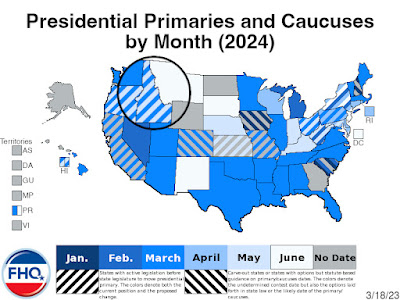But that did not happen.
Instead, the state Senate dragged through another legislative day at a glacial pace as the state House stood by, finished with its work and awaiting further action from the upper chamber.
One matter the Senate was able to dispense with was defining the parameters around which the presidential primary will operate for the 2024 cycle. Those bills -- one to eliminate the stand-alone March presidential primary (H 138) and one to consolidate that election with the mid-May primaries for other offices (S 1186) -- were passed on Thursday, March 23. And since the former bill had earlier passed the state House in it current form, the bill was signed by the requisite parties in both chambers and enrolled, ready to be transmitted to the governor for consideration.
But again, that bill merely ends the separate March presidential primary. It does not build the necessary infrastructure into state code to add a presidential line to the May primary for other offices. That amending action is contained in the trailer bill, S 1186. If the amending bill does not also get a thumbs up from the House, then there would simply be no presidential primary in Idaho for 2024. However, that was not the intent of the original bill, incomplete though it may have been. And that likely is not the intent of legislators in the lower chamber either.
Nonetheless, S 1186 is not yet on the House calendar for when it is due to reconvene on Tuesday, March 28. New to the chamber, the bill would first have to go through committee, and although it has been referred to House State Affairs, S 1186 is not yet on the panel's docket. FHQ is not suggesting that the trailer bill will not be dealt with. It likely will be. The delay is only a function of the end-of-session logjam.
But what is interesting is that the state Republican Party opposes the primary's shift to May, and it retains the ability to opt for earlier caucuses as a means of assessing presidential preference among Republicans in the state in 2024. Should the governor sign H 138, then proponents of the bill will have gotten at least part of what they wanted out of the 2023 regular session: they will have eliminated the separate presidential primary and saved the state more than $2 million. But the second part of this -- adding the presidential line to the May primary ballot -- becomes superfluous if the state Republican Party ultimately opts to caucus instead of using the later primary.
The legislative delay at the end of this session, then, may provide legislators (if not the Idaho Republican Party) some time to consider those options in a way that may affect further progress on S 1186. In other words, that action could be saved for a special session (should one be called) after the Republican state central committee makes any decisions on its 2024 delegate selection process. The party may not want to conduct caucuses, but it also does not want such a late presidential primary. It would appear to be a bit of a lose-lose proposition for state Republicans at the moment.
Yet, that is all speculative. The state legislature will answer some if not all of these questions as it presumably wraps up its regular session work in the week ahead.
Related:
--
Recent posts:




